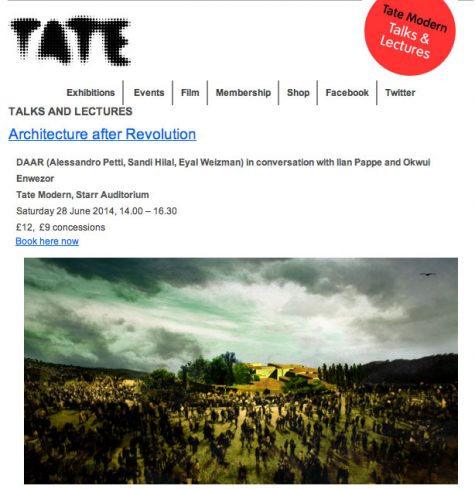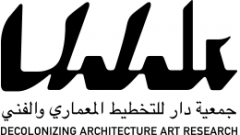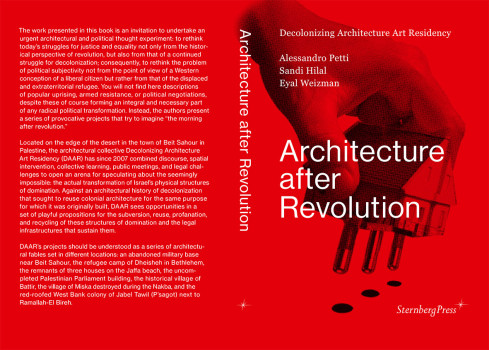30 October – 1 November, 2013, at Haus der Kulturen der Welt (HKW), Berlin /Germany
The workshop takes place in the framework of the international, interdisciplinary symposium A Journey of Ideas Across – In Dialogue with Edward Said, 31 October – 2 November, 2013, at HKW.
Organizer: HKW, Berlin/Germany.
Concept and realization: Sandi Hilal and Alessandro Petti, DAAR (www.decolonizing.ps), Beit Sahour and Campus in Camps (www.campusincamps.ps), Dheisheh Refugee Camp, together with HKW.
In Western political thought, the notion of public space is often associated with a “collective interest”, a “common good”. However, in other cultural contexts, such as in Arab countries, the notion of public space is seen as suspicious. In years of colonial direct domination, the public has never denoted the “collective interest” of the local population; rather it expressed the arrogant, violent and exploitative power of the white European élite. In the name of the public, state colonial authorities expropriated what people shared in common. For instance, the expropriation of land by colonial authorities in the name of the “public interest” shows how the public does not necessary coincide with the common good. The difference between a static and rhetorical notion of public and the inventing and interactive notion of common has been polarized by the obsession of states apparatus with security and control. The overregulation of public spaces expresses the fear of the authorities to see a plaza, a roundabout, a boulevard transformed into a political space able to undermine state authorities.
Unfortunately, most of the Arab regimes that followed independence from colonialism continue to suffocate the very existence of common spaces. Public spaces -instead of expressing freedom, people sovereignty and dignity- turned into the repressive and conservative face of the regime. The neo-liberal waves that invaded the Arab world during the last two decades dismantled any possibility of a public space linked to common unplanned uses.
However, since 2010, the Arab revolts have opened new political directions and possible re-articulations of the public, the common, and the private. These events could be fundamentally interpreted as the will to re-imagine and re-claim the existence of common spaces. The demonstrations in Habib Bourguiba Avenue in Tunis, the occupations of the roundabout in Tahrir square in Cairo, and Pearl roundabout in Manama are only a glimpse into a more profound struggle for the common political spaces in the Arab world.
Revolts
During the weeks following the Egyptian revolt that began on January 25, 2011, we observed a public plaza transform into a common space owned by the people themselves. Tahrir Square became the political space where new claims were invented, represented, and translated into political actions. The day after President Hosni Mubarak was forced to step down, protesters began cleaning the space, an act that highlighted the end of a regime and the beginning of a possible new era for the Egyptian people. The space was no longer perceived as public—the space of authority—but rather as the space of the people. Owning the space implied owning the future of the country. Cleaning the square was a gesture of re-appropriation, ownership, and care. In fact, this apparently banal act demonstrated a sense of reconstituted community and collective ownership.
The power of people gathering and transforming public space into a constituent common space manifested itself in other places throughout the Arab world. In February 2011, people began assembling around the Pearl Roundabout in Manama, Bahrain, converting the anonymous infrastructure into a political arena. As in Cairo, this roundabout became a constituent assembly capable of undermining the political regime. Consequently, on March 18, local authorities brutally intervened, completely destroying the roundabout. This demonstrates the importance of a physical space where people can assemble and assert their rights—without it, the virtual space of social networks is ineffective.
The ambiguous nature of contemporary public space can also be observed in Western society. During the summer of 2011, a group of protesters tried in vain to assemble and camp out in several public spaces of New York. Paradoxically, their attempts were limited by regulations and curfews imposed on these spaces. Only on September 17 were the protesters able to set up camp in Zuccotti Park, a privately owned public space. This crack between the public and private perhaps represents all that remains of a shared collective space, what we call a common space, nether public nor private.
The aim of the workshop is to expand the reflection on public space beyond these events and exploring ways in which the public and common spaces are shaped and constituted.
We would like to propose a critical understanding of the contemporary notion of the public by re-imagining the notion of the common. Rather than the term “commons,” more familiar in the Anglo-Saxon tradition, we prefer to use “common” in order to refer to its Latin origin communi. The latin communem is composed of com=cum “together “and mòinis, originally meaning “obliged to participate”. This fundamental aspect of the common, a demand for active participation, is also present in the Arabic term al mashaa’, which refers to communal land equally distributed among farmers. This form of “common land use” was not fully recognized under Ottoman laws – for this reason, masha was not acknowledged under a written title in the Ottoman Code – and was dismissed by colonial authorities for its supposed economical inefficiency. Colonial regimes, interested in territorial control, see in masha land a collective dimension beyond state control. Consequently, masha have been transformed into state land and therefore fall under the control of public land managed by state apparatus. Masha is shared land, which was recognized through practice in the Islamic world. It emerged as a combination of Islamic property conceptions and customary practices of communal or tribal land. Masha could only exits if people decided to cultivate the land together. The moment they stop cultivating it, they loose its possession. It is possession through a common use. Thus what appears to be fundamental is that, in order for this category to exist, it must be activated by common uses. Today we may ask if it is possible to reactivate the common cultivation, expanding the meaning of cultivation to other human activities that imply the common taking care of life (cultivation from Latin colere=taking care of life).
The Refugee Camp as Site of Political Invention
Refugee camps are definitely sites where the categories of public and private no longer make sense. Within camps, neither public nor private property exists. After sixty-four years, Palestinian refugees still cannot legally own their houses (though in practice they do) and the camp is a space carved from the territorial state. Though states and non-governmental organizations are actively participating in conceiving and managing camps, we are still struggling to fully comprehend how the camp form has contaminated and radically transformed the very idea of the city as an organized and functional political community. Thus, the birth of the camp calls into question the very idea of the city as a democratic space. If the political representation of a citizen is to be found in public space, in the camp we find its inverse: here, a citizen is stripped of his or her political rights. In this sense, the camp represents a sort of anti-city, but also a potential counter-site in which a new form of urbanism is emerging beyond the idea of the nation-state.
Considering the returns of Palestinian refugees will not only insist on the changing of the political system of Israel and Palestine, but it will also imply the transformation of the entire region. There are almost half a million refugees in Lebanon and Syria, and two million in Jordan. Exploring the present return means also exploring ways in which the figure of the refugee and its associated spatial regime of dislocation reshape the larger geo-political space of the present.
The format of the workshop
The workshop, that will take place at the Haus Der Kulturen der Welt, is centred on practices and conceptualization of common spaces in the Arab World. It will take the form of discussions around the idea of common space including and beyond the places of the Arab Revolts. There will be the participation of young collective, theoreticians, activists, artists and academics. The participants, some invited and some nominated through an open call, will come from the Mediterranean countries. In order to aloud lively and informal discussions, part of the conversations will take place in private and public spaces in Berlin, involving more directly its inhabitants and engage with local community.
…..
Please submit an abstract not exceeding 500 words (1 page), explaining with what ideas, topics and projects you would like to contribute to the workshop, together with your CV to project assistant Fabian Ledwon, Ledwon@hkw.de by August 17, 2013.
Selected participants will be granted the journey to Berlin and accommodation in Berlin for the duration of the workshop and the symposium. All travel arrangements will be organized by HKW.
Contact:
Haus der Kulturen der Welt John-Foster-Dulles-Allee 10 10557 Berlin – Germany
Tel: +49 (0)30 39 787 0
www.hkw.de
Supported by the German Federal Foreign Office and Goethe-Institut as part of the German- Egyptian and German-Tunisian Transformation Partnership.
Call for Participation_Workshop Al-Masha or the Space of the Common_30.10.-1.11.2013_HKW


